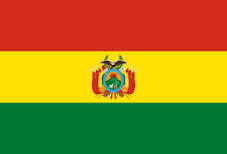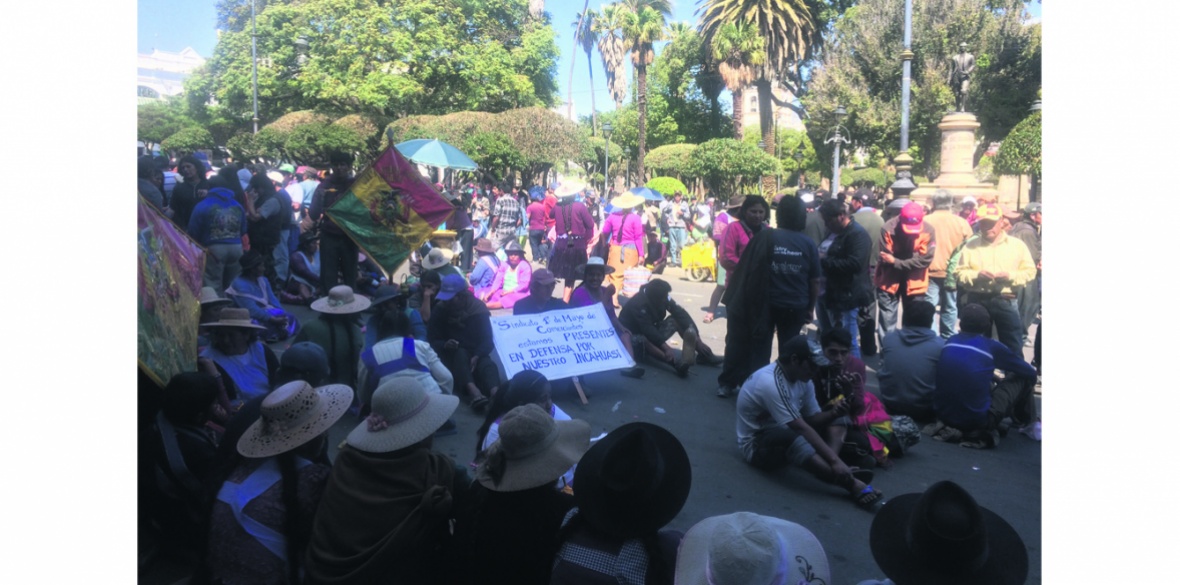Why the Bolivian City of Sucre Is in Lockdown
A dispute over ownership of Bolivian natural gas reserves has seen the citizens of Sucre blockade their own city and launch a general strike. BETHANY RIELLY reports

For the past two weeks the historic capital city of Bolivia has been in lockdown. A general strike and mass road blocks have turned the once chaotic capital of Sucre into a ghost town, with roads devoid of cars, markets closed and the usual crowds of schoolkids nowhere to be seen.
Getting around or out of the city is near impossible and even on foot it’s a feat to squeeze past barricades of stationary buses.
The lockdown is the result of years of contention over the ownership of one of Bolivia’s largest natural gas reserves — Incahuasi.
Although the fields lie on the border of two departments, the larger of the two, Santa Cruz, claims that Incahuasi falls solely within its territory.
Its claim went unchallenged by the national government in 2016 when gas was first extracted from the site and since then Santa Cruz has received 40 per cent of the profits from the rich reserves (50,000 barrels of oil equivalent per day). The remaining 60 per cent is taken in the form of tax by the government.
Its bordering department Chuquisaca, of which Sucre is the capital, receives nothing from the fields. In April, the situation changed as the national government decided to freeze funds to Santa Cruz pending research by Bolivia’s state-owned gas company YPFB to determine which side of the border the gas reserves fall.
The decision brought the issue into the public eye and triggered Sucre’s workers-led civil committee to call the longest strike the capital has seen since 2010 with universities, schools, markets, shops and transport workers united in strike action.
The majority of roads inside and outside the city have been blocked with buses, tents and in some cases, random collections of objects — the strangest I’ve seen so far being a child’s toy car.
On top of this, thousands march through the streets every day, setting off fireworks which ring through the air like gunshots, while students on hunger strike camp out on the roads.
“You can see the strike has been overwhelming,” Federation of Drivers of Chuquisaca secretary general Sixto Sandi tells me.
“All the sectors have been involved in a way that, in some places, not even motorbikes can go through, only people.
“We’ve been supporting the strike of all our colleagues — taxes, vans, buses, trucks … And all the sectors that fit in our federation. We are on strike in support and benefit of our department.”
Across all professions, ages and classes the people of Sucre seem to be united in the belief that the fields belong to them and that they should get a fair share of the profits.
And it’s easy to understand why. The Incahuasi fields are located in Nor Cinti province which is in the department of Chuquisaca.
“Incauhasi is Chuquisaca’s,” Carolina, a Spanish teacher from Sucre, tells me, adamantly repeating the slogan of the protesters. “But the people here are not able to enjoy what belongs to Sucre.
“When they discovered the gas, the eyes in Santa Cruz all fell on it and they claimed it was theirs immediately. But it’s not true, it’s Sucre’s.”
Even the name Incahuasi, named after the surrounding area, is one derived from Quechua, an indigenous language that is spoken in Chuquisaca and not Santa Cruz.

Source: author
The fact that only Santa Cruz receives profits from the fields has fuelled distrust of the national government among the people of Sucre.
Student Bryan Flores, who was camping outside San Francisco Xavier university with 28 other hunger strikers, believes that the Bolivian government has allowed Santa Cruz to monopolise the gas in order to win votes in the forthcoming election.
“The government does not care about us because we don’t give votes to them and we are small,” he tells me.
“The government said it’s nothing to do with us and they made a law which enshrines that we don’t receive any of this money. But we know that we are in this land.”
Although neither department gives much support to Bolivian President Evo Morales, the student believes his government favours Santa Cruz over Chuquisaca because it has the largest chunk of the electorate with a population of 3,412,921. In comparison, Chuquisaca is one of the smallest departments in Bolivia with just 581,347 people.
Flores adds that Chuquisaca — one of the poorest departments in the country — desperately needs the money that Incahuasi would provide.
“We have to be here because we need Incahuasi. The money from the petrol could go to making more things, making more jobs. Workers at the moment go to Santa Cruz rather than staying here. If there was more money, more jobs here, they would stay,” Flores says.
Sinto also holds the national government to blame.
“All the produce has been sent to Santa Cruz as opposed to Chuquisaca,” he tells me. “The problem is that the government doesn’t share equally the production of the gas field between the two.”
Although the majority of the people in Sucre share the belief that the department should receive profits from Incahausi, many don’t agree with the blockades as a means to achieve these demands.
“They’ve had a huge effect on my life,” Carolina tells me. “I can’t get to my house, I can’t get food into my home, it’s affecting me economically. And my children are harmed too because they haven’t been able to study for 10 days.”
The blockades have also proved dangerous in different ways. Last Thursday a child died in an ambulance that was impeded by the blockades.
And a local man was found dead early last week by blockades on the main road to Alcantari airport, 4.8km from Sucre. Two English backbackers told me that they saw the body after being forced to leave their taxi after it was attacked by a group of men blockading the motorway. It’s believed he was shot while trying to cross the barricades.
Tourists as well as some locals have watched the debacle unfurl with utter confusion. Why are the people of Sucre locking themselves into their own city?
“It’s self-flagellating,” Carolina remarks. “We should go to where the government is and protest and blockade there because here the government doesn’t care, it doesn’t know, it’s not important to them.”
When I asked Flores why he and his fellow students were blocking their own city he replied:
“If you don’t do anything, things will pass and nothing will change.”
A few days after I spoke to him, the students moved their protest to the town of Machareti to join groups blocking a road along the boundary between Chuquisaca and Santa Cruz. This road is also the main route to Argentina, Bolivia’s second-biggest trade partner.
Over the weekend the civic committee suspended the strike and lifted the blockades in Sucre, but it’s unlikely that the respite will last long as the protesters were dealt another blow on Friday.
The YPFB report determining which department owns Incahuasi concluded that “the reservoirs of the Incahuasi Aquio fields are located only and exclusively in the department of Santa Cruz.”
After two weeks of fighting, the latest blow to the protesters suggests that the blockades are far from over and, with more strategic blockades preventing trade with Bolivia’s neighbours, there’s also a chance the protest could spread across the country.

